Gulf Arab Summit Aims To Signal Solidarity Amid Iran Tensions

Persian Gulf Arab leaders gather on Tuesday for an annual summit expected to stress cohesion after a deep rift, at a time of regional concerns over Iran.

Persian Gulf Arab leaders gather on Tuesday for an annual summit expected to stress cohesion after a deep rift, at a time of regional concerns over Iran.
The Saudi crown prince toured Gulf states ahead of the summit, which comes nearly a year after Riyadh put an end to a 3-1/2-year Arab boycott of Qatar that had shattered the US-allied Gulf Cooperation Council.
"I have to admit there are areas that will need some time, but I mean practical, functional (Gulf) cooperation is back on track," senior UAE official Anwar Gargash said last week.
Saudi media said Crown Prince Mohammed bin Salman's tour aimed to highlight solidarity as global powers seek to revive a nuclear pact with Iran, amid deepening Gulf uncertainty about the US role in the region.
Riyadh and Abu Dhabi, concerned about Iran's nuclear ambitions, missile program and regional proxies, are engaging with Tehran to contain tension.
Saudi Arabia and the UAE have moved away from hawkish foreign policies that saw them wade into Yemen and lead the boycott of Qatar, to a more conciliatory approach as they vie to lure foreign investment and win over US President Joe Biden.
Abu Dhabi has moved faster to mend fences with Iran and Turkey while also re-engaging with Syria after forging ties with Israel last year.
Reporting by Reuters
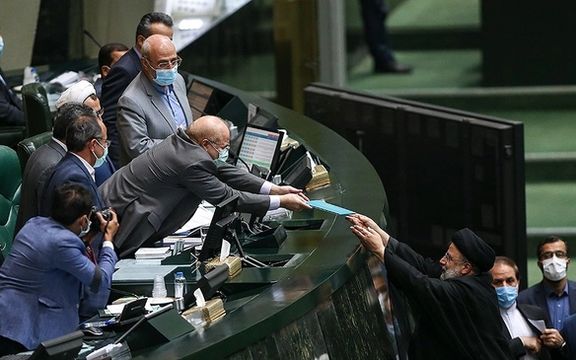
A leading economic daily in Tehran says the main implication of Iran's new budget bill for ordinary people would be higher inflation in the months to come.
Donyaye Eghtesad (World of Economy) has highlighted the elimination of cheap dollars government has been providing to importers of food and medicine as the main factor, which will boost prices.
The government's annual budget bill for the new Iranian year that starts on March 21,2022 was handed over to the parliament for ratification on Sunday. Usually, the bill will undergo dramatic changes before it takes its final shape probably in February or March.
During the past two years, the parliament and the government had so many problems over the annual budget that their debates remained inconclusive after several weeks and Supreme Leader Khamenei handed over the ratification of the bill to the heads of the executive, judiciary and legislative powers.
This year, political analysts have said that debates over the budget are likely to widen the gap between the parliament and the presidential administration more than ever before. The Majles Speaker, and the parliament's biggest fraction, the Paydari Party members are preparing to fight over the lion's share of the budget.
Last year a deputy Majles Speaker charged that Speaker Mohammad Bagher Ghalibaf made changes in the budget numbers after its final ratification. But the matter was pushed under the carpet to avoid further controversy.
According to Donyaye Eqtesad the delaying of retirement age will be raised to take some pressure off from the Social Security Organization. The organization has been facing problems in recent years as cash from the pension fund was diverted into some failed business activities, reducing available cash.
Olia Alibeigi, a member of the trustees of the organization has charged in an interview with the Iranian Labor News Agency (ILNA)on Monday that successive government and the parliament in Iran think they can withdraw money from the pension fund whenever they need to solve other economic problems.
Meanwhile, observers say an average 10 percent salary increase for government employees amid 50-percent inflation, will add to dissatisfaction among the workers. On Monday, thousands of Iranian teachers clashed with the police near the parliament after security agents attacked protesters who wanted a pay adjustment to make up for the impact of the country's back-breaking inflation. Not only government office workers are affected but millions of workers in state-owned industries.
Social media users in Iran have pointed out that the 10 percent raise for government employees is ridiculous while Raisi has proposed a 300-percent increase for the expenses of the Presidential Office.
Meanewhile, many economists argue that not providing cheap dollars to importers of essential goods, may save around $8 billion annually. But the problem is that many in parliament, economists and politicians say this would add fuel to inflation, which has already reached 45 percent this year.
Rising inflation, small salary increases and the amount of tax the government is planning to collect from citizens are likely to exert immense pressure on the nation. Experts talking to Iran International Television during Sunday and Monday predicted that one of the implications of the new budget bill is the increased likelihood of protests in Iran.
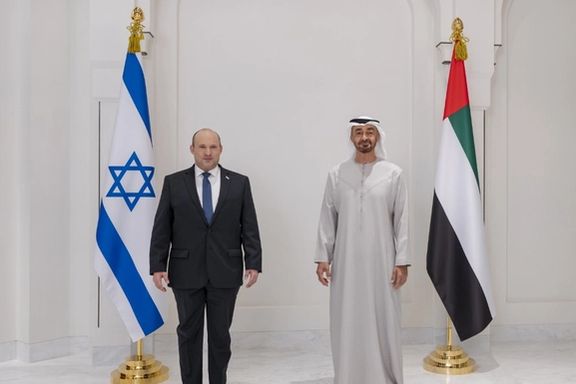
Leaders of Israel and the United Arab Emirates discussed Iran in their first ever meeting on Monday but both sides gave little detail about their discussion.
The United Arab Emirates' de facto ruler Abu Dhabi Crown Prince Sheikh Mohammed bin Zayed al-Nahyan hosted Israel's Prime Minister Naftali Bennett in their first ever public meeting.
Israel's ambassador to Abu Dhabi said the issue of Iran was on the agenda for their talks, which follow the formalization of Israel-UAE relations last year under a US-led regional initiative.
While shared concern about Iranian activity was among reasons for establishing full relations, the UAE has also been trying to improve ties with Tehran, amid Iran’s expanding nuclear program.
Iran has condemned moves by Arab countries to normalize relations with Israel, although it has begun advocating close ties with neighbors since the election of President Ebrahim Raisi. Talks have also taken place between Iran and Saudi Arabia although no breakthrough has been achieved.
Releasing photographs of Bennett and Sheikh Mohammed smiling and shaking hands, the Israeli leader's office described the meeting as "historic".
Before he flew home later in the day, Bennett's office said in a statement that Sheikh Mohammed had accepted an invitation to visit Israel. There was no immediate confirmation from UAE officials.
A statement on state news agency WAM said Sheikh Mohammed voiced hope for "stability in the Middle East" and that Bennet's visit would "advance the relationship of cooperation towards more positive steps in the interests of the people of the two nations and of the region".
Israeli Ambassador Amir Hayek declined to elaborate on any discussion of Iran, but he told Israel's Army Radio: "The prime minister did not only come here solely to address the Iranian issue."
With world powers now trying to renew the Iran nuclear deal, Abu Dhabi last week sent an envoy to Tehran. A US delegation is due in the UAE this week to warn Emirati banks against non-compliance with sanctions on Iran.
Iran is Israel's arch-foe, but it has not been mentioned publicly by Bennett since he set off on Sunday to the UAE with pledges to promote bilateral commerce and other forms of civilian cooperation.
The Israel Hayom newspaper, quoting unnamed officials, said Bennett was expected to brief Sheikh Mohammed on intelligence regarding Iranian-supplied militias and drones in the region.
Israel last month broached setting up joint defenses against Iran with Gulf Arab states. Hayek said military sales to UAE are in the works, though Israeli industry sources say advanced Israeli air defense systems have yet to be offered.
"Israel is in cooperation with a new friend, with a partner for the long-term, and the considerations will be both considerations of defense and also considerations of how you work with a country which is very, very, very friendly to Israel," Hayek said.
Bennett said he told his government to step up efforts to reach a free trade agreement with the United Arab Emirates by the first quarter of 2022.
Israel-UAE bilateral trade in goods alone reached nearly $500 million so far in 2021 - up from $125 million in 2020 - and is expected to continue growing rapidly.
Reporting by Reuters
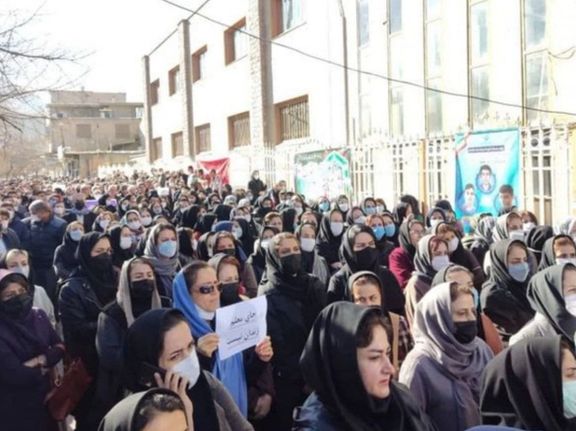
On the third day of their strike, tens of thousands of teachers across Iran staged rallies Monday demanding higher pay and freedom for colleagues in prisons.
Teachers demanded implementation of legislation, which would bring salaries and pensions in line with of other civil servants, would benefit around 750,000 teachers.
The budget bill that President Ebrahim Raisi presented to parliament December 12 proposes increasing the education ministry's budget by 14 percent but does not identify specific resources to increase teachers' salaries matching the reform plan.
Videos posted on social media showed rallies in Tehran, tens of smaller cities, and most province capitals including, Ahvaz, Tabriz, Zanjan, Kerman, Rasht,Yasuj, and Bushehr.
In Sari, capital of the northern province of Mazandaran, protesters were reportedly arrested. Social media posts showed protestors outside parliament in Tehran shouting "scoundrels, scoundrels" at security forces. A video from Shirazshowed protesters chanting "Detained Teacher Must Be Freed,” "Rise Teachers to Eradicate Discrimination.”
Monday's protests were held without interior ministry permits. Unlicensed protests are illegal, and authorities recently dispersed recent unlicensed water protests in Khuzestan and Esfahan.
Some teachers also shouted slogans in support of Rasoul Bodaghi, a leading figure in a teachers' trade association, who was arrested Saturday.
Bodaghi has been briefly detained several times since release from prison in 2016 following a six-year prison sentence from a revolutionary court in 2010 for “assembly with the intent to disrupt national security” and propaganda against the state. In 2015 Bodaghi was sentenced to a further three years’ jail but the sentence was not enforced.
Protesting teachers demanded the freedom of detained colleagues and the recognition of their constitutional right to protest and form independent unions, both of which they say are curbed by the need for permission for protests.
Referring to water protesters in Esfahan, one protestor in Tehran carried a poster: "My pupil was blinded; shotgun pellet is not the response to demanding water." The poster referred to the crackdown on water protesters in Esfahan 26 November where several protesters were blinded by shotgun pellets.
This was widely circulated on social media. A medical official told Iranian state television on November 27 that 40 people in Esfahan had been treated for eye injuries sustained the previous day.
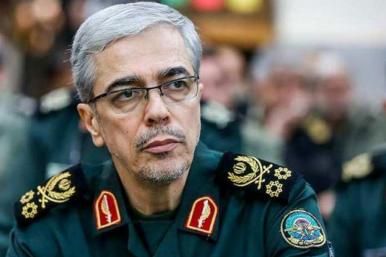
The chief of staff of Iran’s armed forces said Monday that Tehran had meetings with Saudi And Emirati sides and to an extent “misunderstandings” were resolved.
General Mohammad Bagheri was speaking in a meeting with the visiting deputy commander of Oman’s armed forces. He added that no contacts have been established with Bahrain, but Oman can perhaps help in that matter.
Iranian and Saudi officials held meetings earlier this year, that according to Riyadh were exploratory and did not lead to any breakthrough. Saudi Arabia severed ties with Iran in 2016.
Saudi and Iranian experts took part in a security dialogue in the Jordanian capital Amman which discussed confidence-building measures between the regional rivals, Jordan's state news agency Petra reported on Monday.
A senior Iranian diplomat told Reuters that no Iranian official attended the session, which Petra said was hosted by the Arab Institute for Security Studies.
"What was held in Amman was not an official meeting. But of course, such meetings between academics are useful to give better understanding about realities between the two neighbors," the diplomat said.
Israeli Prime Minister Naftali Bennett visited Abu Dhabi and met Abu Dhabi Crown Prince Sheikh Mohammed bin Zayed al-Nahyan on Monday, where they discussed Iran among other issues.
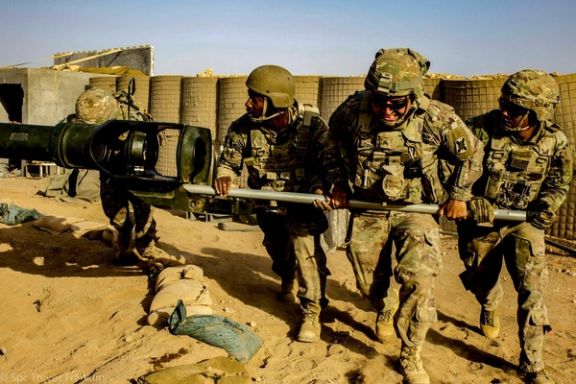
Syrian government and opposition media report a US airdrop in eastern Syria designed as a raid against arms dealers and people suspected of working with the Islamic State group.
The official Syrian news agency SANA reported of a US raid where civilians “were abducted”, while the Syrian Observatory for Human Rights (SOHR), an opposition monitoring group based in London described the operation as a security campaign.
The operation was conducted by Syria Democratic Forces allied with the United States and US Coalition Forces, according to SOHR, in Al-Busayrah town in the eastern Deir Ezzor province, early on Monday. There has been no confirmation from Coalition sources.
The report referring to SOHR’s local sources said four people were killed in the raid, including a teacher and his two sone. One of the sons was suspected of arms dealings.
An undetermined number of people suspected of arms dealings and civilians were also arrested in the operation when Al-Busayrah was surrounded, and people were asked to surrender by loudspeakers. SOHR says gunfire and explosion erupted but it was not clear if it was caused by an exchange of fire between the two sides or by the security forces in pursuit of suspects.